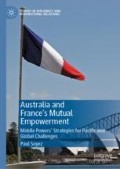Abstract
The Australian–French strategic partnership, demonstrated by a gradually increasing military cooperation, was enabled by one prerequisite: the end of strong tensions between France and Australia regarding French nuclear testing in the South Pacific. The French nuclear program in French Polynesia, conducted between 1966 and 1996, was one of the major hindrances to the French–Australian bilateral relationship. This chapter argues that the strength of French–Australian tensions pertaining to nuclear armament stems from the fact that nuclear issues have acted as two opposite tools of power for the two countries. France has developed independent nuclear capacities to support its aim to remain a global power, while Australia has regularly used anti-nuclear campaigns as a topic of niche diplomacy to become a stronger middle power. Moreover, both countries’ behaviours have exacerbated these tensions, France arrogantly refusing to discuss the issue with its Pacific neighbours and Australia conducting a duplicitous uranium diplomacy. Tensions surrounding the French nuclear program in French Polynesia mainly mirrored how Australia and France had two very different perceptions and strategies regarding global security: the French one, basing global security on nuclear deterrence and conducting nuclear testing in order to maintain its strategic independence, and the Australian one, based on the reduction of nuclear armaments and full support of the American security order. However, the end of French nuclear testing in 1996 and France’s support for non-proliferation, along with Australia’s diplomatic ambition to assert its regional leadership, enabled the two countries to develop a tangible strategic dialogue to progressively become jointly responsible for the South Pacific’s security.
Access this chapter
Tax calculation will be finalised at checkout
Purchases are for personal use only
References
Archives Nationales, Pierrefitte, France.
National Archives of Australia, Canberra, Australia.
Beazley, K 2003, ‘The Hawke Years: Foreign Affairs and Defence’, in S Ryan & T Bramston (eds), The Hawke Government, a Critical Retrospective, Pluto Press, Melbourne, pp. 347–366.
Cot, JP 1973, ‘Affaire des Essais nucléaires (Australie c. France et Nouvelle-Zélande c. France). Demandes en indication de mesures conservatoires. Ordonnances du 22 juin 1973’, Annuaire français de droit international, vol. 19, pp. 252–271.
Dumoulin, A & Wasinski, C 2010, ‘Justifier l’arme nucléaire. Le cas français pendant les années 1990’, Études internationals, vol. 41, no. 1, pp. 79–96.
Falk, J, Green, J & Mudd, G 2006, ‘Australia, Uranium and Nuclear Power’, International Journal of Environmental Studies, Melbourne, vol. 63, no. 6, pp. 845–857.
Firth, S 2016, ‘Australia’s Detention Centre and the Erosion of Democracy in Nauru’, The Journal of Pacific History, vol. 51, no. 3, pp. 286–300.
Hymans, JEC 2000, ‘Isotopes and Identity: Australia and the Nuclear Weapons Option, 1949–1999’, The Nonproliferation Review, vol. 7, no. 1, pp. 1–23.
Maclellan, N & Chesnaux, J 1998, La France dans le Pacifique, de Bougainville à Mururoa, La Découverte, Paris.
Mohamed-Gaillard, S 2010, L’archipel de la puissance? La politique de la France dans le Pacifique Sud de 1946 à 1998, P. Lang, Bruxelles.
Monnoyer, L 1997, ‘La légitimation par la science: un défi pour la démocratie’, Hermès, vol. 1, no. 21, pp. 157–169.
Nye, JS 2011, The Future of Power, Public Affairs, New York.
Piquet, M 2000, Cold War in Warm Waters: Reflections on Australian and French Mutual Misunderstandings in the Pacific, The University of Melbourne Press, Melbourne.
Author information
Authors and Affiliations
Rights and permissions
Copyright information
© 2019 The Author(s)
About this chapter
Cite this chapter
Soyez, P. (2019). Threatening Australia’s Backyard? French–Australian Tensions on Nuclear Policies and Their Resolution. In: Australia and France’s Mutual Empowerment. Studies in Diplomacy and International Relations. Palgrave Macmillan, Cham. https://doi.org/10.1007/978-3-030-13449-5_4
Download citation
DOI: https://doi.org/10.1007/978-3-030-13449-5_4
Published:
Publisher Name: Palgrave Macmillan, Cham
Print ISBN: 978-3-030-13448-8
Online ISBN: 978-3-030-13449-5
eBook Packages: Political Science and International StudiesPolitical Science and International Studies (R0)

